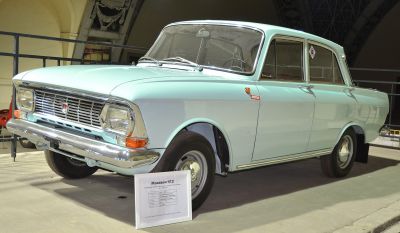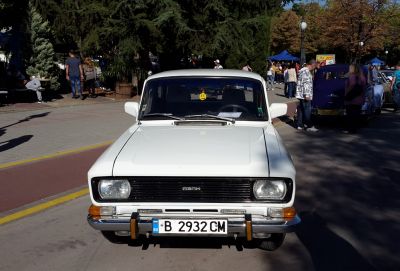 1976 Moskvich 2138 Dimensions, Size & Specs
1976 Moskvich 2138 Dimensions, Size & Specs
Measurements of the 1976 Moskvich 2138, engineered for optimal performance and comfort
| Dimensions | |
|---|---|
| Length: | 4250 mm167.3 in13.9 ft |
| Width: | 1550 mm61.0 in5.1 ft |
| Height: | 1480 mm58.3 in4.9 ft |
| Weight Specifications | |
| Curb Weight: | 1080 kg2381 lbs |
| Tire Specifications | |
| Tire Size: |
|
The Moskvich 2138 is a classic Soviet-era sedan produced from 1976 to 1987. This model exhibits a practical and modest design typical of Moskvich vehicles of the period. Measuring 4250 mm in length (approximately 167.3 inches), 1550 mm in width (about 61.0 inches), and 1480 mm in height (around 58.3 inches), the 2138 offers a compact yet comfortable profile well suited for urban and suburban driving environments. With a curb weight of 1080 kg (approximately 2381 pounds), the sedan balances manageable size with the robustness required for varying road conditions common in the Soviet Union during its production years. The vehicle runs on 165/80 R13 tires, a common specification for sedans of its era, providing reliable traction and handling. Overall, the Moskvich 2138 sedan represents an important piece of automotive history reflective of the design priorities and functional needs during its decade-long production span, offering enthusiasts and collectors a well-sized and distinctive car from a notable Soviet manufacturer.
Discover the standout features that make the 1976 Moskvich 2138 a leader in its class
Have a question? Please check our knowledgebase first.
The Moskvich 2138 sedan, produced between 1976 and 1987, has a length of 4250 millimeters (167.3 inches), a width of 1550 millimeters (61.0 inches), and a height of 1480 millimeters (58.3 inches). These compact dimensions reflect the car's design focused on practicality and economy during its production period. Its relatively modest width and height make it suitable for navigating narrow urban streets typical in many parts of Europe and the former Soviet Union.
The Moskvich 2138 weighs 1080 kilograms (2381 pounds) curb weight, meaning the vehicle's weight including all necessary operating consumables but excluding passengers or cargo. This weight is light for a sedan, contributing to reasonable fuel efficiency and ease of handling given the vehicle's era and engine options. However, compared to newer vehicles, it may feel less solid or smooth due to older suspension and engineering designs but remains relatively nimble given its compact size.
Yes, the Moskvich 2138 fits comfortably into a standard garage. Typical garages are about 2400 to 3000 millimeters (94.5 to 118 inches) wide and about 4800 to 6000 millimeters (189 to 236 inches) deep. Given the Moskvich 2138's length of 4250 millimeters (167.3 inches) and width of 1550 millimeters (61.0 inches), it allows ample clearance on all sides, enabling easy parking and maneuvering. The relatively low height of 1480 millimeters (58.3 inches) also poses no issues for garage door heights, which usually exceed 2100 millimeters (82.7 inches).
Compared to its predecessor, the Moskvich 412 (produced until the early 1970s), the 2138 maintained a similar compact footprint but incorporated some modernizations in design and engineering. The 412 was roughly comparable in length, around 4200 millimeters (165.4 inches), with similar width and height dimensions, but the 2138 featured updated styling and slightly refined proportions. Overall, the Moskvich 2138 offered a modest evolution in size and practicality, keeping the car relevant amid changing market demands, while retaining Moskvich's characteristic compact sedan format.
When compared to similar compact sedans of the 1970s, such as the Lada 2101 or the Volkswagen Golf Mk1, the Moskvich 2138 occupies a competitive size bracket. Its length of 4250 millimeters (167.3 inches) aligns closely with the Lada 2101, which is approximately 3990 millimeters (157.1 inches) long, and slightly exceeds smaller hatchbacks like the Golf Mk1, which measures around 3700 millimeters (145.7 inches). Width-wise, the Moskvich is narrower than many Western sedans, enhancing its urban maneuverability, while its height is average for sedans of that time period.
The Moskvich 2138 rides on tires sized 165/80 R13. This means the tire width is 165 millimeters, the aspect ratio (sidewall height as a percentage of width) is 80%, and it fits on 13-inch diameter wheels. The relatively narrow tires with taller sidewalls helped absorb bumps and uneven surfaces common on roads of the era, enhancing ride comfort. However, the tradeoff was less sharp handling compared to modern low-profile tires. This tire setup matches the vehicle’s modest power output and suspension design, balancing comfort and stability.
While exact interior height figures for the Moskvich 2138 aren't typically specified, the exterior height of 1480 millimeters (58.3 inches) suggests a cozy but practical cabin space typical of compact sedans of the 1970s. Passenger headroom and legroom were adequate for four adults, with the rear seat designed for short to medium trips rather than extended comfort. The car’s compact width of 1550 millimeters (61.0 inches) limits shoulder room somewhat. Overall, the Moskvich 2138 offered utilitarian interior space focused on function over luxury.
The Moskvich 2138's curb weight of 1080 kilograms (2381 pounds) is relatively light compared to contemporaries like the Volvo 240, which could weigh over 1200 kilograms (2645 pounds), or other Soviet-era sedans that often exceeded 1200 kilograms. This lighter weight helped the Moskvich maintain reasonable fuel efficiency for its time by reducing strain on the engine. Although specific fuel consumption figures vary by engine type and driving conditions, the reduced weight contributed to lower fuel consumption and easier handling, important factors for everyday drivers in its production regions.
Specific ground clearance data for the Moskvich 2138 is not always documented in available specifications; however, typical Moskvich sedans of this era had ground clearances around 170 to 180 millimeters (6.7 to 7.1 inches). This clearance is ample for typical city roads and reasonably uneven surfaces, though not geared for serious off-road use. The slightly elevated clearance helped the car endure rougher road conditions common in the Soviet Union and Eastern Europe during its era, providing versatility for diverse driving environments.
In comparison to modern compact sedans, the Moskvich 2138 is smaller in overall dimensions, particularly in width and height. Modern compact sedans, such as the Toyota Corolla or Volkswagen Jetta, tend to be longer (around 4600-4700 mm), wider (1800 mm or more), and taller, offering more interior space, safety features, and comfort. The 2138's more angular and minimalist 1970s design contrasts with today's aerodynamic styling and advanced materials. However, the Moskvich retains charm as a classic practical sedan, prioritizing simplicity and economy over modern technologies and spaciousness.
Discover similar sized cars.

| Production: | 1967-1969 |
|---|---|
| Model Year: | 1967 |
| Length: | 4250 mm167.3 in |
| Width: | 1550 mm61.0 in |
| Height: | 1480 mm58.3 in |

| Production: | 1969-1976 |
|---|---|
| Model Year: | 1969 |
| Length: | 4250 mm167.3 in |
| Width: | 1550 mm61.0 in |
| Height: | 1480 mm58.3 in |

| Production: | 1976-1988 |
|---|---|
| Model Year: | 1976 |
| Length: | 4250 mm167.3 in |
| Width: | 1550 mm61.0 in |
| Height: | 1480 mm58.3 in |

| Production: | 1978-1988 |
|---|---|
| Model Year: | 1978 |
| Length: | 4250 mm167.3 in |
| Width: | 1550 mm61.0 in |
| Height: | 1480 mm58.3 in |
